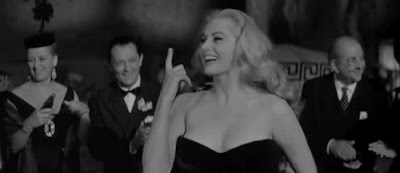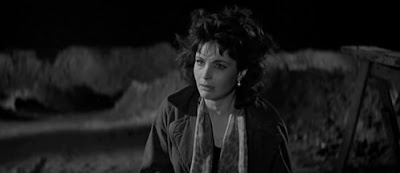The Gaps
I always find it amusing when
people act surprised and shocked when they find out that I, or anyone else for
that matter, have not seen that “great film”. It is a bit ridiculous because
even if one dedicates his whole life to watching movies there will always be
great films that he has yet to see. And even when this man on a mission is
lying on his deathbed because of old age (or rampant movie watching) there will
be someone to be shocked by a film that he has not yet seen.
All cinephiles that I’ve met have
wide gaps in their film knowledge, and this is quite natural since no one has
that kind of time and since the definition of a great film is a rather subjective
one. But still it is a reaction that a cinema fan faces often, especially on
the fanatic film battlegrounds of internet opinionating. And this brings me to
one of my great gaps - the cinema of Federico Fellini.
I read quite a bit about film so
I have a superficial familiarity with Fellini’s work, but apart from a large
chunk of “Amarcord” that I’ve seen as a teen on TV (and eventually fell asleep
to) I have not seen a single one of his films. This finally changed last night
when I saw “La Dolce Vita”, and despite its rather unconventional structure and
length it turned out to be a wonderful film to start filling that Fellini gap
with.
“La Dolce Vita” follows Marcello,
a journalist in Rome, through a series of loosely connected episodes from his
life that seem to primarily revolve around his interactions with women. They
also send Marcello through all spheres of Rome’s society, showing the poverty,
religion and the upper classes of the city. It is very much a collage of
post-war Rome seen through the eyes of one man, who is observing the city’s
moral decay as well as participating in it. And as much as “La Dolce Vita” is
about Marcello it also seems to be a film about Rome.
The episodic structure of the film makes it feel very light and loose, but it is also seems to have stylistic traces of the Italian neo-realist movement which often dealt with minor stories that had great personal ramifications. But instead of dealing only with the lower sphere of society, as Italian neo-realist films did, “La Dolce Vita” is about the whole spectrum of society in Rome. From a lowly street worker to a desirable cinema diva that is visiting the city. These vignettes are connected by the characters that surround Marcello, and sometimes the film jumps right in the middle of a personal drama like in the sequence that starts off with Marcello breaking up with his clingy girlfriend.
This is one of the aspects of the
film that fascinated me the most. It is also one of the most enchanting directorial
touches of the film as it challenges you to ask yourself what exactly is
happening to Marcello and the other characters in the gaps between the
vignettes? Sometimes the following episode of Marcello’s life gives us the
answer, but more often than not the answer is very much up to the viewer.
The other fascination of “La Dolce Vita” are of course the women. And Fellini has most certainly selected a rather fetching assortment of all kinds of beautiful, difficult and captivating ladies. It is obvious that he, just like Marcello, is obsessed with women and their mysteries and these sentiments just seep through the film and are further underlined by the amazing last shot of the film.
“La Dolce Vita” is a fantastic
film, there is no denying the obvious. The craft on display is magnificent and
the characters, although not always sympathetic, are consistently intriguing to
watch. It is a film that I look forward to returning, and it makes me look
forward to watching more of Fellini’s work. And that is exactly what I plan to
do.
Cast:
Marcello Mastroianni - Marcello Rubini
Anita Ekberg - Sylvia
Anouki Aimee - Maddalena
Yvonne Furnaux - Emma
Magali Noel - Fanny
Original language - Italian
La Dolce Vita on IMDb





No comments:
Post a Comment